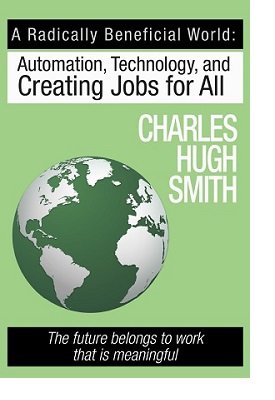The Federal Reserve, Interest Rates and Triffin's Paradox
November 19, 2015
There is no way Fed policy can be win-win-win for all participants.
One result of the global dependence on central bank interventions is a unhealthy fixation on the slightest changes in those interventions, oops I meant policies.
Since the slightest pull-back in central bank inflation of asset bubbles could spell doom for the global economy and everyone holding those assets, the world now hangs on every pronouncement of the Federal Reserve in a state of extreme anxiety.
Why the extreme anxiety? Because any change in Fed intervention creates both winners and losers. There is no way Fed policy can be win-win-win for all participants, and to understand why we turn to Triffin's Paradox, a.k.a. Triffin's Dilemma.
The core of Triffin's Paradox is that the issuer of a reserve currency must serve two quite different sets of users: the domestic economy, and the international economy.
Triffinís Paradox has two basic parts:
1. Any nation that issues the reserve currency must run a trade deficit to supply the world with surplus currency to hold in reserve and as a result,
2. The issuing nation faces the paradox that the needs of global trading community are generally different from the needs of domestic policy makers.
The global trading community requires that the issuer of the reserve currency run trade deficits large enough to satisfy the demand for reserves, while domestic audiences want a strong export sector, i.e. a trade surplus.
You canít have it both ways: if you want to issue a reserve currency, you have to run a trade deficit that is commensurate in size with the global demand for your currency.
Since supply and demand set price, this push-pull affects the value of the U.S. dollar: U.S. exporters want a weak dollar to spur foreign demand for their products, while foreign holders of the USD want a strong dollar that holds its value/purchasing power.
It is impossible for any nation to maintain the reserve currency and run trade surpluses. If you run trade surpluses, you cannot supply the global economy with the currency it needs for reserves, payment of debt denominated in the reserve currency and domestic credit expansion.
Were the Fed to raise interest rates, as it has essentially promised to do, it will do so to pursue multiple objectives:
1. It's attempting to preserve its credibility, which is threatened by a zero-interest-rate forever policy.
2. It's attempting to maintain its political capital, which is eroding as even the mainstream media has accepted the reality that Fed policy has enriched the already-wealthy at the expense of everyone else.
3. It's attempting to "normalize" interest rates without killing its favorite child, the stock market.
4. It's attempting to raise rates without upsetting the fragile global currency/debt cart.
Note the use of the word attempting. The Fed's success is not pre-ordained (despite its implicit claims to otherworldly powers).
If the Fed raises rates a tiny .25%, the actual impact on debtors is rather modest. But even this tiny increase has the potential to sour carry trades, i.e. speculations based on borrowing U.S. dollars (USD) and investing the money in higher-yielding (but oh-so risky) emerging market gambles.
Those emerging market bets are denominated in the home-country currency, and as those currencies decline against the USD, the carry trade's gains are offset by foreign exchange (FX) losses.
The losers of any Fed hike in interest rates are already clear: U.S. global corporate profits have already been hit by the stronger dollar, and should interest rates click higher, that will only further strengthen the USD.
As the dollar strengthens, the $7 trillion in dollar-denominated debt in emerging markets increases in value relative to depreciating local currencies.
The Fed can't please everyone. That's the dilemma. Some commentators have suggested China seeks a higher USD (i.e. a Fed rate hike) because that lowers the value of China's currency the RMB (yuan), making it cheaper for Americans to buy more goods from China.
But any increase in yields will push down the value of existing Treasury bonds, so China's still-vast hoard of Treasuries will lose value should rates rise.
As I have often noted, many people assume a weakening dollar is a good thing because it makes U.S. exports cheaper. But the larger truth is that a strengthening currency raises the global purchasing power of the currency, enriching every owner of the currency and the issuing nation.
There are many cross-currents in play here, and a variety of opinions on the consequences. I join my long-time colleague Gordon T. Long and fellow blogger/writer Rick Ackerman for a wide-ranging discussion in the hour-long video What to Expect From the Fed:

Get a 25% discount on my new book this week only: A Radically Beneficial World: Automation, Technology and Creating Jobs for All: The Future Belongs to Work That Is Meaningful. The Kindle edition is $7.45 this week, a 25% discount from its list price of $9.95. (offer extended to 11/22/15)
The print edition is $25, but there's a $10 discount this week through my publisher's page for the book: you must use the code TL6PDA4D to get the $10 discount. Note this does not include shipping, and requires making the purchase through Createspace.
Here is the link to the book's Amazon.com listing, Introduction and Chapter One (free PDF).
"Certainly the author is decades ahead of his time. Humanity will eventually adopt the author's principles written in all of his books. Currently, humanity lives in delusion that the system will continue to serve them. We will see massive changes even in the next decade. Don't waste your money on college--buy the author's books and succeed." Book Reader (via Amazon.com)
NOTE: Contributions/subscriptions are acknowledged in the order received. Your name and email remain confidential and will not be given to any other individual, company or agency.
|
Thank you, Brenda W. ($55), for your superbly generous contribution to this site -- I am greatly honored by your steadfast support and readership. |
Thank you, John K. ($20), for your most generous contribution to this site -- I am greatly honored by your support and readership. |

Discover why Iím looking to retire in a SE Asia luxury resort for $1,200/month.